When it comes to survival skills and preparedness planning, some old-school things like Cowboy Trail Tallow continually stand the test of time. If you haven’t heard of it before, it’s a versatile form of rendered animal fat that you can conveniently store in a durable tin.
Rugged pioneers, cowboys, and homesteaders often carried it with them for cooking, lubrication, and even skin care. Just to name a few.
From a preparedness point of view, knowing how to make, store, and use cowboy trail tallow will add to your arsenal of what it takes to survive and thrive when the grid goes down.
What is Cowboy Trail Tallow?
Cowboy Trail Tallow is typically made from slowly rendered beef fat, which is cooked down until impurities are removed. This leaves behind a clean, shelf-stable fat. Unlike fresh meat fat, which spoils quickly, tallow has a much longer shelf life and doesn’t require refrigeration if prepared and stored properly.
Historically, cowboys traveling long distances on the trail carried tins of beef tallow as part of their provisions. It was lightweight, compact, and served many purposes, making it the perfect multi-use supply. Modern preppers appreciate the same qualities: long shelf life, high energy value, and versatility in both daily use and survival scenarios.
How to Make Cowboy Trail Tallow
If you want to stock up on this old-fashioned essential, you can make it yourself with some simple tools and patience. When it comes to sourcing the beef fat, I recommend looking for a full-service or country butcher. They tend to process animals themselves. Then ask them for fat taken from the kidneys and loins.
Ingredients
- 2–5 pounds beef suet, hard fat, or beef trimmings
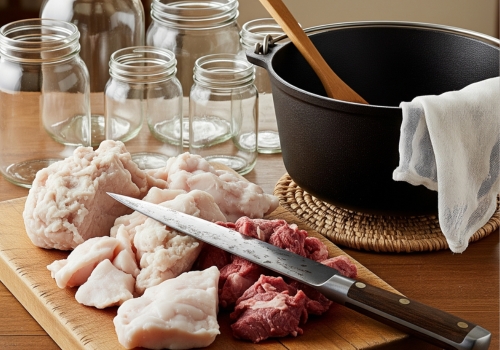
Equipment
- Sharp knife (for trimming and chopping)
- Cutting board
- Heavy pot or Dutch oven or crockpot
- Wooden spoon or heat-safe spatula
- Cheesecloth or fine mesh paint strainer
- Heatproof bowl (to strain into)
- Clean, dry tins or glass jars with lids
- Funnel (optional, but helpful for pouring hot liquid safely)
- Cooling rack
Instructions for Making Cowboy Trail Tallow
Once you have all your ingredients and equipment, you can use the following steps to make cowboy trail tallow.
Step 1: Source & chill beef fat
Acquire beef fat or tallow and place it in the freezer for 20 minutes to firm it up without actually freezing it.
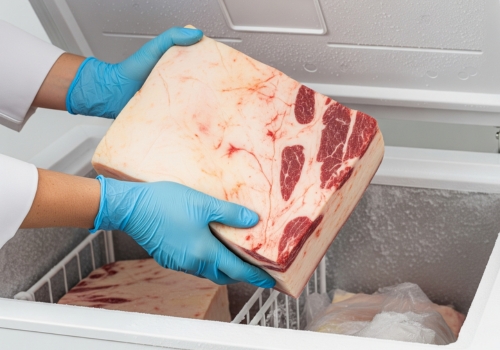
Step 2: Trim and chop.
Cut away any meat or connective tissue, leaving only the fat. Chop the fat into small, even, roughly 1-inch pieces so it renders more evenly.
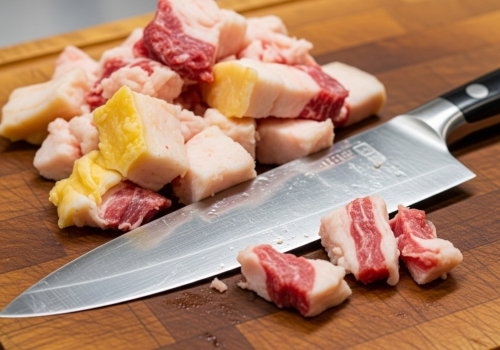
Step 3: Slowly render the fat
Place the chopped fat in a heavy pot or slow cooker over low heat. Be patient; keeping the temperature low prevents burning and ensures a clean tallow.
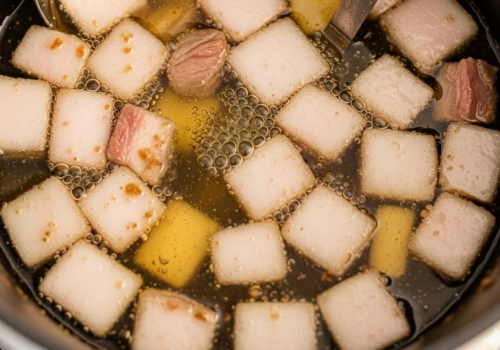
Step 4: Strain and filter
Once the fat has fully liquefied, pour it through a cheesecloth or fine paint strainer to remove any bits of meat or tissue.
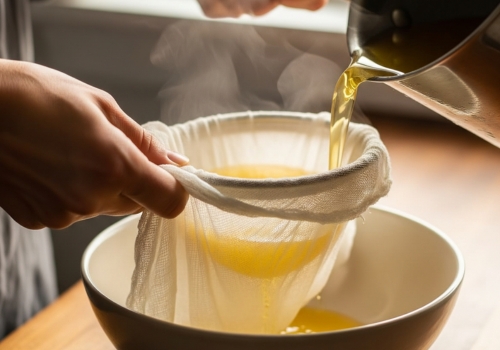
Step 5: Pour into tins or jars
While still hot and liquid, carefully pour the strained tallow into clean, dry tins or glass jars.
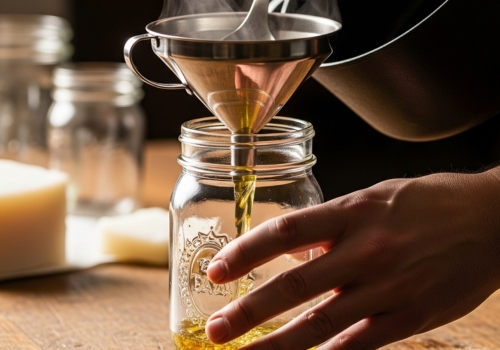
Step 6: Cool and solidify
Allow the tallow to cool at room temperature until it becomes solid.
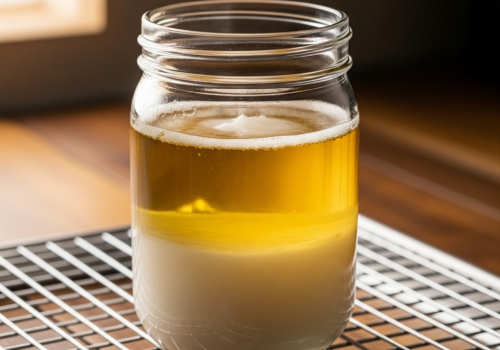
Step 7: Seal and store
Once the cowboy trail tallow is firm, seal the containers tightly and store them in a cool, dark place.
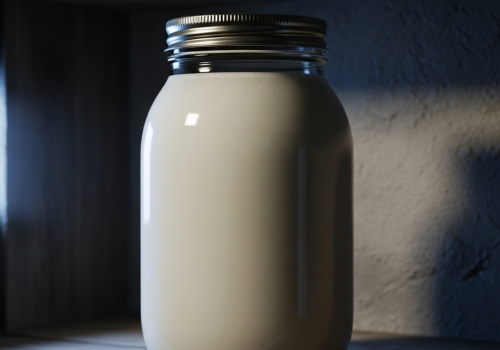
Shelf Life and Storage Tips for Cowboy Tallow
Cowboy Trail Tallow is remarkably shelf-stable when made correctly. However, a few tips can help maximize its longevity beyond 6 months.
- Store in tins or glass jars with tight seals to prevent moisture or contamination.
- Place a layer of aluminum foil over the top for the tallow to reduce contact with the air in the headroom of the can, jar, or storage vessel.
- Keep in a cool, dark place (ideally this one here) away from direct sunlight or heat sources.
- Avoid moisture at all costs. Moisture shortens the life of rendered fat.
- Consider portioning into smaller tins so you only open what you need.
Properly rendered and sealed, tallow can last 12 to 18 months at room temperature, and even longer if refrigerated or frozen.
 Alternative Fats for Making Cowboy Trail Tallow
Alternative Fats for Making Cowboy Trail Tallow
Cowboy trail tallow was traditionally made with beef fat, as that’s what pioneers and western cowboys had easy access to. However, there are some other animal fat sources that you can also use if you have them on hand. Though the end product might be slightly different than cowboy trail tallow from rendered beef fat.
Venison Fat
Deer works much the same as beef tallow, but it tends to be drier and crumblier once rendered. It’s still shelf-stable if purified properly, though it can have a stronger “gamey” flavor. Best suited for cooking in hearty stews, frying, or seasoning cast iron.
Hog Lard
Rendered pork fat is softer than beef or venison tallow, and it doesn’t harden quite as firmly. It was widely used for cooking, frying, and baking by pioneers. Properly rendered and stored, it can last for months, though it’s not quite as stable as beef tallow. You can hedge your bets by selecting fat from areas near tough joints like the shoulder, hips, and hams.
Other Animal Fats
Tallow rendered from sheep, goat, or even bear grease is possible. Historically, cowboys and pioneers used whatever animal fat they had access to. The key is to render it slowly and filter it carefully so impurities (bits of meat, blood, water) don’t spoil the batch.
For preppers and survivalists, beef tallow is usually preferred because it’s very stable and neutral-tasting, but venison fat or lard can definitely be used if that’s what you have. Just note that the storage life and flavor will vary depending on the fat source.
Why Cowboy Trail Tallow is Helpful for Preppers
 Preppers and survivalists prioritize supplies that are lightweight, long-lasting, and multi-purpose in their stockpile, and cowboy trail tallow checks all those boxes.
Preppers and survivalists prioritize supplies that are lightweight, long-lasting, and multi-purpose in their stockpile, and cowboy trail tallow checks all those boxes.
Long Shelf Life: Properly stored tallow can last for extended periods without refrigeration.
High Caloric Density: Fat packs more calories per gram than carbohydrates or protein, making it an energy powerhouse. It’s also easily digestible as a survival food.
Versatility: From cooking to lubrication to skin protection, tallow has countless applications.
Low-Tech Production: No electricity or modern equipment is required to make or use it. So, you can make it even during a prolonged grid failure.
There are also other historically significant recipes you can try yourself that share these qualities. Here are a few examples:
All of these and more than 120 other recipes are available in The Lost SuperFoods, a book available in physical format.
There are only a few copies left, so click here and order your book now.
Cooking with Cowboy Trail Tallow
One of the main reasons cowboys carried tallow was for cooking. It was used much like butter or oil. It can be used for things like:
- Frying meat, potatoes, or bread in a skillet over a campfire
- Adding flavor and richness to beans or stews
- Greasing pans to prevent food from sticking
In survival situations, tallow provides essential calories and can be used to prepare a wide range of foods without relying on modern cooking oils that spoil more quickly.
Non-Culinary Uses for Cowboy Trail Tallow
Another reason Cowboy Trail Tallow became a staple was its adaptability beyond cooking and skincare. Some additional uses include:
- Lubricant: For tools, firearms, or moving parts that need grease in the field
- Candle making: A wick dipped in tallow becomes a quick, functional candle
- Fire starter: Tallow catches flame easily, making it a useful emergency fire aid
- Leather conditioner: Rubbed into boots, saddles, or packs to maintain durability
- Lubricant: Simple moving metal parts like hinges can be kept from squeaking with a little tallow.
These “bonus uses” make tallow far more valuable than a single-purpose food item.
Cowboy Trail Tallow for Skincare and Protection
On the open range, cowboys didn’t have fancy lotions or balms. Instead, they used tallow directly on skin as a natural moisturizer. Its protective qualities make it useful for:
- Healing dry or cracked hands from manual labor
- Protecting skin from wind, sun, and mild frostbite
- Serving as a base for homemade salves
If you want ready-made solutions, you can choose tinctures that support your skin and help slow down aging.
These mushroom-based tinctures (The Mushroom FOURtress) have been used for centuries in Traditional Chinese Medicine. They contain dual-extracted fruiting body tinctures of cordyceps, lion’s mane, reishi, and turkey tail. Each of these powerful medicinal mushrooms offers unique, research-backed benefits for both body and mind.
Final Thoughts on Cowboy Trail Tallow
Cowboy Trail Tallow may not look flashy compared to modern gear, but its value lies in its time-tested reliability. For centuries, it fueled cowboys, pioneers, ranchers, and survivalists through harsh conditions. Today, it still offers a lightweight, shelf-stable source of calories that can also be used for skincare, fire-starting material, and basic lubrication.
It’s best to work with beef fat harvested from the kidneys and loins. However, venison tallow or hard fat from hogs is also a viable alternative. Then, slow-render it in a vessel on low heat, straining meticulously. Allow to cool in a tin or glass jar. Then keep sealed in a cool, dark place for up to two years.
Before you go, I want to recommend an excellent product for gaining independence when it comes to water. The Water Freedom System was developed based on declassified U.S. military plans. This system has been used for years on the frontlines in arid deserts, and now it’s available for the general public. Check out the plans here!
You may also like:
How To Make ANZAC Biscuits (5+ Years Shelf Life)
The Lost Incan SuperFood Recipe Revealed by NASA (Video)
7 Food Preservation Methods From The Bible You Can Still Use Today
Stop Ignoring These Long-Lasting Protein Sources

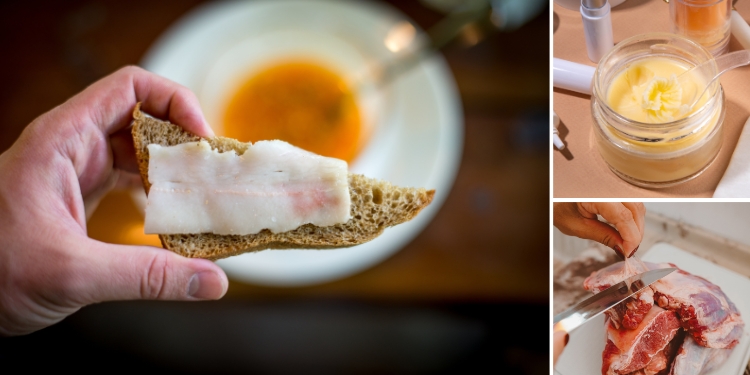





















Good article.
Grew up on beef and hog fat for cooking.
Have jars of it put up for prep.
Some of my tallow is 5yrs old and perfectly good today.
My granny just added tallow to a skillet that never got dump just add more tallow to the pan and man was her food so so good.
Butt I got married and yes my wife never knew what it was like growing up on a homestead and growing all that you needed there on the farm.
She will not eat a chicken that I butchered or any veggies that I grow. Trust me it’s been hard getting her to look at prepping as a way of life. So yes we go to the store and buy poison crap from the store.
When we first got together she came to my house and did not know what that yellow stuff was in a bowl in the frig. I said, it’s home made butter from the cream off the RAW milk I got from the dairy behind my house. Blew her away.
Well 36 yrs later, still buying crap.
But I do prep all kinds of everything for my self.
Never gone to the Doctor for any heath issues, in my life, a testimony to good home farm life.
My wife has had 5 different Cancers and multiple heath problems. Go figure…
I do watch what I eat, no GMO, BIO or anything that the FDA say is good for you.
Stay close to the farm life. I sure do miss it.
Do have a garden and grow lot of stuff for me. lol…
stay sharp
Red, we seem to be from the same age and upbringing. I kind of feel like Forrest Gump when he says I don’t remember being born, I don’t remember when I didn’t know how to churn butter, render tallow, or render the pork fat into a good lard. I am sure I had that one gallon Daisy churn down pat before I ever tied a shoestring. The article is accurate and detailed it just took awhile for me to realize that most people out there today missed out on the childhood you and I had.
Hey domeliving.
I was wondering who’s foot prints, I see on this old long highway I been traveling on. Glad to walk with you, brother.
Yes I do miss the younger days, even as poor and hard as it was, still miss it.
Yes most do not know what they have missed growing up.
Forest Gump is one of my favorites…
Sorry, so long to reply, been busy finishing up a 1963 Ford truck, finally, been some time now.
Glad to see everyone replying to the article and each other.
I fill ya, Thanks domeliving.
stay sharp
Red , really appreciate your article and response
not many in todays rich culture can appreciate Depression style living or cowboy on the farm, ranch , range , field cooking
our societys are so entrenched and indoctrinated in the lies , they cannot even relate the hardships
Growing up with depression parents we always had Fat, Lard, Meat and real Food s
Today everything is culturally made for you to die offf slowly and feed the big pharma medical system on the way out . slow is profitable , fast means No returns on investments
so the lie s of food are really big and deep .
mom always kept lard, bacon greese , real salts, real spices for this realson .
yes Food Parishs , and spoils , if NOT then it is FAKE , FRANKENFOOD designed not to spoil and designed to make you sick slowly , so you pay on your way out
Cheep , fast , Food
Christopher.
Thank you for your response.
I do love the old old days and if I could live in an old log cabin with no power and just an oil lamp an out house and some animals, O’ and a garden also. I would move right now.
Keep up the old ways. Eat right also, lol…
stay sharp
Howdy from high in the desert swamp,
I used to get fat trimming from the local store for free. Others came after me, so they decided to sell it. I get 5 pounds of fat for 3 dollars. I trim it like this article says. I put it in a crock pot on low for 6-8 hours. 5 pounds makes about a quart of tallow. The liquid is the tallow and some debris. The solid are gristle, tendons and fat. I strain it through a sieve into a quart jar and let it cool for about 30 minutes. I put cheese cloth doubled and pour it into another jar leaving the water that separated on the bottom of the other first jar. I refrigerate until solid off white color. I look at the bottom. If there is any water or brown, I scoop out the tallow until the bottom will pour out. The solid pieces that have brown on them I cut off with a knife and toss. The white I put back into the clean jar. The debris that causes rancid is gone. This will last a long time depending on how you use it. I have a jar of pemmican I used it for from 2021. It’s fine. I have a jar in my fridge from 1/2023. I used it this morning. I haven’t been camping in a while and just thought about a small tin to be used in the yard when I fire cook chili or sloppy Joe’s. I will get a tin from hobby lobby and do this. I will store it in a baggy in case it leaks.
Making or rendering tallow is very simple.
Be cautioned: Tallow is slicker than slick.
I use tallow to start and if needed I add non vegetable oil. This is to extend the supply of tallow. I don’t fry with it to reuse so it has all sorts of seasoning in it. It’s not hard to render. The crock pot does all the work. A sharp knife, the crockpot, sieve, cheese cloth and two jars. The dog gets the meat from the trimming so happy campers all around.
I also have old man psoriasis on my temples. I rubbed some on there about two months ago and it cleared up. When it starts to come back, I rub it in. My Holistic Doctor said I was a genius. I took a small Vaseline container and used it almost to the bottom. I mixed tallow, aloe vera and the Vaseline together and rub that on dry skin/psoriasis. It works when prescription steroid didn’t.
Tallow has many uses. I have two kid size chairs from hair on Longhorns. The leather where the rawhide lines tied it tight have broken. I am going to take the hides off and rub with tallow to see if it softens the hides. If it does, great. I can sew those for a pouch. If not, I was going to get rid of them anyway.
Remember the Alamo
Remember 9/11
Remember North Carolina
Remember to have your soul prepared
Been seeing more and more tallow on the store shelves recently, the good stuff runs about 7.00 a pound, some of the bulk containers are less and still get good reviews. I cook several small meals a day and mostly use butter since I don’t fry much, I like lard in my beans and biscuits, haven’t used tallow yet but going to try it. Animal fats are healthier than plant fats, go figure.
I have the same process but add a few. After the first straining into a mixing bowl that goes in the fridge overnight. I then slide the layer of tallow out of the bowl back into the sauce pan, add half a cup of water and about a teaspoon or two of salt. Salt pulls impurities from the tallow. boil for a few minutes and then strain into mixing bowl again water and all. into the fridge to setup. At this point tallow is almost snow white and 98% pure. Sometimes I stop here or do it one more time: into pan, add water and salt, boil and strain. At this point the tallow does NOT smell like beef anymore and can be used for cosmetics if wanted. I then add to jars and process for 10 minutes. Beautiful snow white tallow. Same process with lard.
When I was young, Gramma saved every drop of beacon fat. Just added or used, never tossed or cleaned out.
When I was 18, they said ANIMAL FAT IS GOING TO KILL US ALL
35 years later they started saying, Maybe, animal fat is not so bad.
5 more years, Animal fat is better than lots of other fats
Hey, what happens if you take the Clean, Hot, fats and pour into clean ball jar and add a new lid and let cool to pull a vacuum ?
I think I might like the long term storage a lot more, especially for jars saved for non kitchen use. Easily trust that at 30 yrs old
I grew up on crisco………but i do love my coconut oil…..peace.
It just came to me that maybe coyboy tallow might be able to be used as a water proofing for your old boots as they start to wear out during the terrible grid down scenario that we all are planning on….might throw off your stinking scent that the dogs will be on .you can then hang them in a tree and use as bait to lure in wild animals…for a easy snack…a interesting tool for your tool belt .
When I render tallow it lard, I use nearly the same process as the article, but after I pour the melted fat I to the hot jars, I put the lids on then, and set the jars in a draft-free place to cool.
The lid seals tightly, and it lasts a long time in the larder.